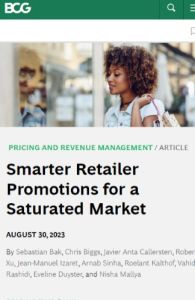Plenty of retailers send out mass promotions hoping to win new customers and inspire purchases. But according to Boston Consulting Group, your retail promotions may have the opposite effect, overwhelming and alienating the consumers you hope to attract. Learn new research-backed strategies for retail promotions and how to avoid the most common promotion mistakes retailers make. Gain insights into how to make a consistent value proposition to your customer base, while launching promotions strategically, with an ethos of continuous improvement.
Stop overwhelming consumers with too many mass promotions.
Between 30% and 40% of retail promotions are either unprofitable or inefficient and risk alienating consumers. Shoppers already feel overwhelmed by an abundance of choice, and sending out too many promotions often overwhelms buyers further. It can be tough for retailers to know which promotions to cut, as many lack the means to gauge the effects of different promotions with any precision. Many retailers are stuck playing the “Uniform Game,” which means they offer uniform prices to their customer base. If this describes your situation, consider leveraging your AI and data collection capabilities to play the “Choice Game,” which entails restructuring your portfolio on a segment-specific basis, reducing the need for blanket promotions. Alternatively, you may want to aim for a more sophisticated approach, playing the “Dynamic Game,” adjusting prices and promotions in real-time.
Many retailers neglect consumers’ needs when planning promotions, and base their strategies entirely on the previous year’s plan, only making adjustments to match supplier preferences. Avoid this mistake...
Sebastian Bak, Chris Biggs, Javier Anta Callersten, Robert Xu, Jean-Manuel Izaret, Arnab Sinha, Roelant Kalthof, Vahid Rashidi, Eveline Duyster and Nisha Mallya are professionals with Boston Consulting Group.








Comment on this summary